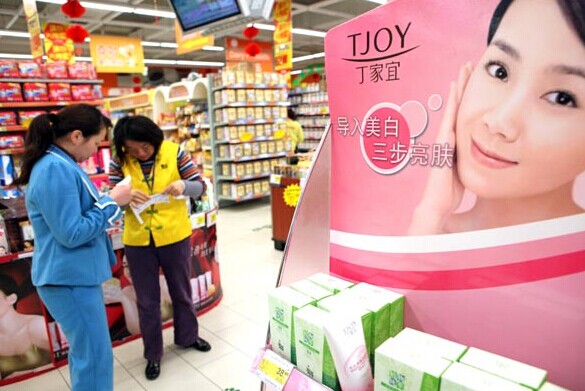

TJoy products displayed at a supermarket in Shanghai. French cosmetics and fragrance group Coty said it will discontinue the TJoy brand to focus on international power brands that have more growth potential in China. Provided to China Daily
When foreign firms buy Chinese product lines, sales sometimes suffer
Recent attempt by a Chinese domestic brand to work with overseas retailers has reportedly fizzled, with French cosmetics and fragrance group Coty Inc announcing it would halt sales of the products of Chinese skin-care brand TJoy.
In an announcement released on Tuesday, New York Stock Exchange-listed Coty said it will "discontinue the TJoy brand to focus on the international power brands that have more growth potential in China", as Coty has just entered into an agreement with Hong Kong-based consumer goods trader Li & Fung Ltd, in which the latter will distribute several of Coty's brands in China, including Adidas, Rimmel and Playboy.
Michele Scannavini, CEO of Coty Inc, said that the company expects its cooperation with Li & Fung to help expand some of its international brands into mass channels, "strengthening Coty's position in the fast-growing market".
Gerard Raymond, senior executive at LF Asia, a business unit of Li & Fung, said it will provide its expertise to Coty in terms of the supply chain, including sourcing, manufacturing and distribution.
Coty completed the acquisition of TJoy at the end of 2010 with $400 million.
Coty's second-quarter results, released in February, showed that the net revenue of the company's skin and body care sector declined by $2.1 million, which Coty explained was mainly "due to a decline in the TJoy brand". In its third-quarter results, Coty reported that "TJoy continued to struggle" despite a new ginseng product line that was launched at the end of last year and the reorganization of its management team and distribution network.
According to Jason Yu, general manager of the global market research institution Kantar Worldpanel China, TJoy's market share in 2011 was 1.1 percent, the first year after it was acquired by Coty. Its market share in the latest 12 months up to the first quarter of this year was only 0.6 percent.
"Since the acquisition in 2010, TJoy has seen consistent share losses as a result of a lack of continued marketing investment as well as new product innovation," Yu said. "According to previous studies conducted by Kantar Worldpanel and Bain, Chinese shoppers are not loyal to brands, so when TJoy lost touch with consumers, its decline was inevitable.
"In the meantime," he said, "we are seeing the rapid growth of other local brands, such as Pechoin, Inoherb and Herborist, capitalizing on the success of their new product pipelines, especially the China herbal concept, with strong in-store presence and media sponsorship."
Looking at the market, few successful examples emerge of overseas giants acquiring domestic Chinese brands.
French cosmetics giant L'Oreal SA acquired Chinese skin-care brand MiniNurse in 2003. But it turned out to be quite unsuccessful, as the brand is scarcely seen anymore. Alexis Perakis-Valat, CEO of L'Oreal China, admitted in a March interview that MiniNurse's market share is quite "challenging" and definitely not where they want it to be "But L'Oreal is still working on it," he said.
At the end of last year, L'Oreal also announced the acquisition of Hong Kong-listed skin-care company Magic Holdings International Ltd for a sizable $840 million.
But according to first-half earnings reports that Magic Holdings released before it delisted in April, the company's turnover during the period was HK$891 million ($114 million), up 8.48 percent over the corresponding period in the previous year.
It was the first time the company reported single-digit growth since going public. In fact the company's growth rate for fiscal 2012/2013 reached 25.3 percent.
In another example, leading daily products brand Maxam, whose market share was as high as 20 percent in 1990, was acquired by US giant SC Johnson & Son Inc for 12 million yuan ($1.91 million at current rate) in 1991.
Maxam's turnover soon dropped, however, from 300 million yuan in 1991 to 6 million yuan in 1992. It did not recover until Shanghai Jahwa United Co Ltd redeemed it in 1994.
Finally, Beijing Dabao Cosmetics Co Ltd was acquired by Johnson & Johnson for 2.3 billion yuan in 2008. Although the US company updated and optimized its products, Dabao has not seen its market share, which stood at 15.76 percent in 1990, increase significantly since then.
Coty to end TJoy skin care brand
2014-06-05Copyright ©1999-2018
Chinanews.com. All rights reserved.
Reproduction in whole or in part without permission is prohibited.